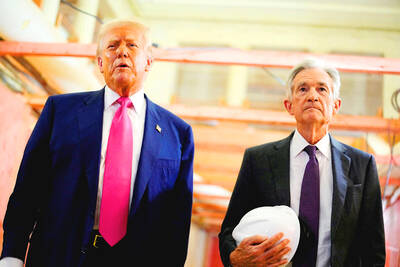The Times and the Sunday Times will become the first British newspapers to charge readers to access all online content from June, Rupert Murdoch’s News International announced on Friday.
Customers will have to pay £1 (US$1.50) for one day’s access and £2 for a week’s subscription, in a move that will be closely watched by a newspaper industry experiencing a steady but inexorable decline in circulation.
Both Times titles will launch new Web Sites in early May, replacing the existing combined site, “Times Online.”
The two new sites will be available for a free trial period to registered customers. Access to the digital services will be included in the seven-day subscriptions of customers to the two newspapers.
News International chief executive Rebekah Brooks said: “At a defining moment for journalism, this is a crucial step towards making the business of news an economically exciting proposition.”
“We are proud of our journalism and unashamed to say that we believe it has value. This is just the start. The Times and the Sunday Times are the first of our four titles in the UK to move to this new approach,” Brooks said.
News International, a division of Murdoch’s News Corp, also owns the tabloids the Sun and the Sunday paper the News of the World.
With newspaper sales in decline and advertising increasingly moving online, owners have been searching for a business model that will make profits from their Web Sites.
The Financial Times already makes readers pay for some online content, while the Wall Street Journal — also part of Murdoch’s media empire — is currently the only major US newspaper charging readers for full access online.
The New York Times announced in January that it would start charging for online content early next year.

IN THE AIR: While most companies said they were committed to North American operations, some added that production and costs would depend on the outcome of a US trade probe Leading local contract electronics makers Wistron Corp (緯創), Quanta Computer Inc (廣達), Inventec Corp (英業達) and Compal Electronics Inc (仁寶) are to maintain their North American expansion plans, despite Washington’s 20 percent tariff on Taiwanese goods. Wistron said it has long maintained a presence in the US, while distributing production across Taiwan, North America, Southeast Asia and Europe. The company is in talks with customers to align capacity with their site preferences, a company official told the Taipei Times by telephone on Friday. The company is still in talks with clients over who would bear the tariff costs, with the outcome pending further

NEGOTIATIONS: Semiconductors play an outsized role in Taiwan’s industrial and economic development and are a major driver of the Taiwan-US trade imbalance With US President Donald Trump threatening to impose tariffs on semiconductors, Taiwan is expected to face a significant challenge, as information and communications technology (ICT) products account for more than 70 percent of its exports to the US, Chung-Hua Institution for Economic Research (CIER, 中華經濟研究院) president Lien Hsien-ming (連賢明) said on Friday. Compared with other countries, semiconductors play a disproportionately large role in Taiwan’s industrial and economic development, Lien said. As the sixth-largest contributor to the US trade deficit, Taiwan recorded a US$73.9 billion trade surplus with the US last year — up from US$47.8 billion in 2023 — driven by strong

AI: Softbank’s stake increases in Nvidia and TSMC reflect Masayoshi Son’s effort to gain a foothold in key nodes of the AI value chain, from chip design to data infrastructure Softbank Group Corp is building up stakes in Nvidia Corp and Taiwan Semiconductor Manufacturing Co (TSMC, 台積電), the latest reflection of founder Masayoshi Son’s focus on the tools and hardware underpinning artificial intelligence (AI). The Japanese technology investor raised its stake in Nvidia to about US$3 billion by the end of March, up from US$1 billion in the prior quarter, regulatory filings showed. It bought about US$330 million worth of TSMC shares and US$170 million in Oracle Corp, they showed. Softbank’s signature Vision Fund has also monetized almost US$2 billion of public and private assets in the first half of this year,

POWELL SUCCESSOR: US Fed Governor Adriana Kugler’s resignation gives Donald Trump an opening on the board, potentially accelerating his decision on the next chair US President Donald Trump suddenly has a chance to fill an opening at the US Federal Reserve earlier than expected, after Fed Governor Adriana Kugler announced her resignation on Friday. It might also force him to pick the next Fed chair months sooner than he had anticipated. “The ball is now in Trump’s court,” LH Meyer/Monetary Policy Analytics Inc economist Derek Tang said. “Trump is the one who’s been putting pressure on the Fed to do this and that, and Trump says he wants to have his own people on. So now he has the opportunity.” Kugler’s exit unfolds amid unprecedented public pressure